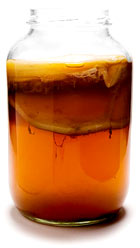

What is Kombucha Tea?
Kombucha is a 'living' health drink which is easy to make at home for all the family. It costs very little - basically all that is required is tea, sugar, a Kombucha 'starter' culture and the right information. Placed in a warm environment, the sweetened tea and culture create a little chemical factory which converts all the sugar, transforming it into a drink which can taste something like a 'zingy' (non-alcoholic) apple cider, a refreshing light wine, or even champagne, depending on what kind of tea you use. Kombucha is a nutritious 'food' drink, containing lots of vitamins, minerals, enzymes and health-giving organic acids.
What is a Kombucha Culture?
The culture is a symbiosis of yeasts (candida friendly) and bacteria. Basically it looks like a smooth creamy beige to white pancake. With every brew you make it forms a new layer or culture on the surface of the liquid, which can be divided, enabling you to pass on spare Kombucha cultures to friends and family.
Where does it come from?
Kombucha Tea took a long journey from Manchuria about 2,300 years ago, by Japan and through rural Russia, where babushkas would keep a pot brewing on a shelf of their cosy kitchens. Some people treated it with reverence and regarded making and consuming the beverage as something of a sacred ritual. Alexandr Solzhenitsyn in his autobiography says it saved his life in the slave camps.
What is a Kombucha Culture?
The culture is a symbiosis of yeasts (candida friendly) and bacteria. Basically it looks like a smooth creamy beige to white pancake. With every brew you make it forms a new layer or culture on the surface of the liquid, which can be divided, enabling you to pass on spare Kombucha cultures to friends and family.
How does it work?
Kombucha can help everyone become more healthy and help prevent disease. More and more doctors and health practitioners are recommending Kombucha Tea to their patients. Kombucha does not treat symptomatically, like chemical drugs do, but holistically, by strengthening and balancing the whole body, allowing it to function better and to heal itself. Kombucha is also excellent as a preventative, maintaining and keeping the body well.
Kombucha Therapy
Kombucha is a holistic therapy. Besides drinking the tea, it has many other applications.
Kombucha tea can be applied topically to the skin:
- As a poultice or compress for abscesses and ulcers
- Made into an effective cream for skin disorders
- Added to bath water, in a foot-bath or as a douche
- As an aid to beauty treating the skin - and as a hair rinse
- Excellent for steam inhalation
- Kombucha drops or nasal spray
- For the treatment of animals - small and large
- In the garden against bugs and to help plants' fertility
- As a natural disinfectant with 100s of uses
- In a wide range of food recipes
What is it good for?
Kombucha supports each person's area of need in the body, helping it to function better which alleviates many symptoms and discomforts. Everyone has their own health weakness, eg. arthritis, kidneys, skin disorders, circulation, etc, or just needing more energy on a daily basis. Kombucha is particularly known for detoxifying the body, strengthening the immune system and balancing the metabolism. It helps with a whole range of symptoms, such as digestive disorders, blood pressure, arthritis, Chronic Fatigue Syndrome (ME), MS, asthma, elimination, eczema, etc.
Are there any side effects?
A few people may experience some detoxification symptoms at the beginning, which is good and is only the body releasing unwanted toxins. This can be eased by taking Kombucha in small amounts to start with, and gradually building up to the recommended amount. It is also advised to drink plenty of water to help flush out the toxins. The other side effect is good health!
How much do I drink?
Dosage: The full recommended amount to take is 150ml (a wine glass full) three times a day, or about 3 litres per person per week. (See Handbook for more on dosage.)
Is Kombucha Tea difficult to make?
Kombucha Tea is easy to make, as long as the simple instructions are followed. With every culture we send we give simple instructions on how to prepare it.
Is there any Medical Research?
After World War II, the medical authorities in Moscow heard of communities living in areas of horrendous industrial pollution and, surprisingly, found that Kombucha Tea was responsible for the immune strength and health of those people. This stimulated much research into its properties. Kombucha made its way westwards, and a number of German doctors, impressed by Kombucha's properties, isolated its constituents and published papers about its health-giving qualities. In America, where Kombucha drinking is popular (four million), and in Britain too, the research has been desultory, probably because research in these countries is undertaken only by large pharmaceutical companies. There's no money in a product that anyone can make for him/herself!


